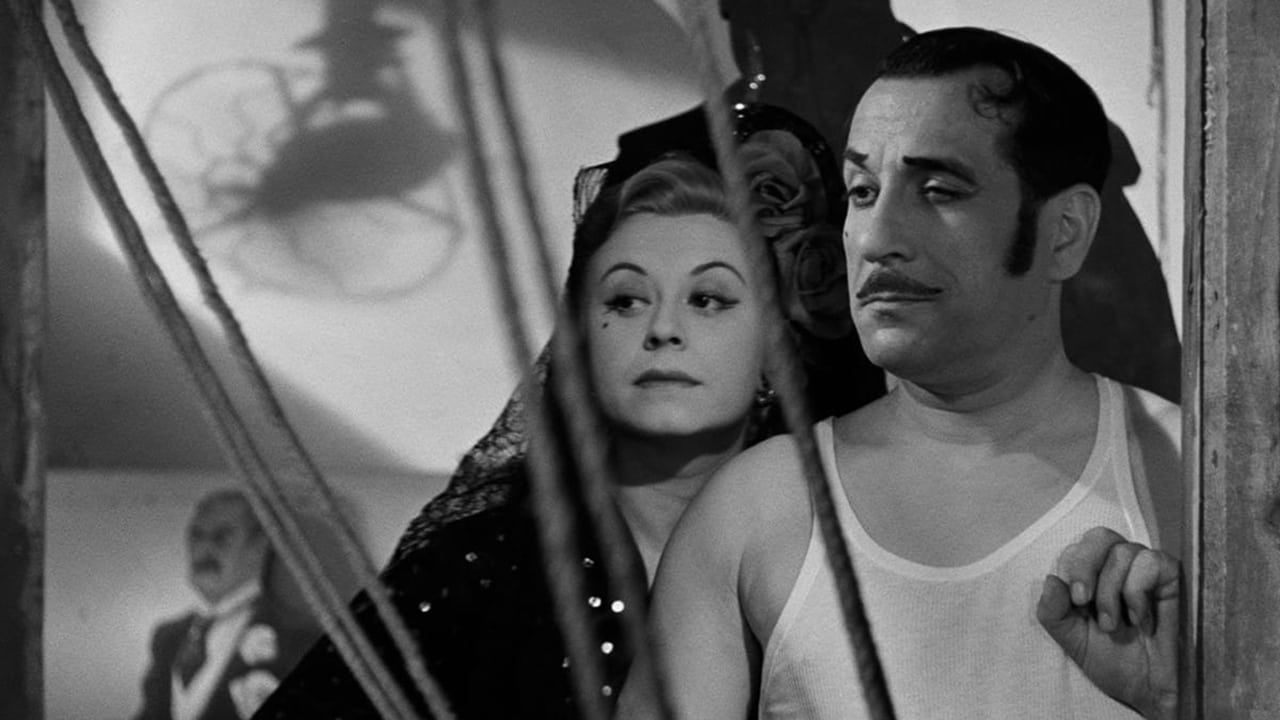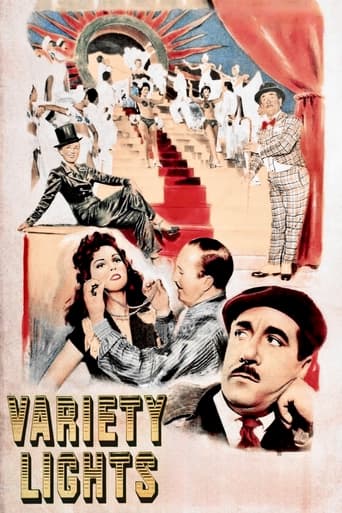

I just saw this for the first time, after sampling much of Fellini's later work over many years.The most surprising thing to me was the sense that Variety Lights (VL) foreshadows Fellini's later "indulgent" work. Here, he bathes the viewer with genuinely warm, almost disconnected bits of life in all its spendor. The fine editing makes it all work; I laughed and sighed out loud through much of this movie, and the first 10 minutes hooked me. A little later in his career, Fellini (with help from other fine story people) showcased straight-up storytelling in La Strada and Cabiria. Subsequent to that, he began exploring "story space" in alinear, character-focused ways, from La Dolce Vita and beyond.The point of all of this is to express my surprise that Fellini appears to have ended his career somewhat as he started it. VL is almost a "throwback" to the directions he took later in abandoning more traditional storytelling methods. Maybe it'd be better to put it this way: When he began diverging from a more conventional narrative style, he was actually taking a step *back* to the style we see in VL. A very good comparison is against his "Fred and Ginger," which explores story space in a studiedly chaotic way, then bowls you over by tying things together with a profoundly touching moment at the end. In "Fred and Ginger," Fellini gracefully brings together his old and new styles. In VL, he seems to bring these together before the new even happened!The tremendous abilities of the actors and actresses are delightful in VL. Something conspicuous in post 8-1/2 Fellini is the purposeful lack of traditional acting craft; Fellini talked about this repeatedly in interviews. In VL (as in La Strada and Cabiria), Fellini shows that he was perfectly capable of directing actors who are plying their skills.Because VL seems to cover the strengths of most of Fellini's career, it is a very fine example of the best he could do. Check it out.
... View MoreVariety Lights is Fellini's debut film. The film consists of ideas and motifs that would succeedingly appear in movies like 8 1/2 and The Clowns. However, these traits are still undeveloped but we can see how they would be used as personal metaphors for the director. Running under an hour, the film is shown in black and white with legible subtitles and moving at a smooth pace. The story follows a variety show troupe and an female audience member who is so inspired by one of their performances that she asks to join their group. We are then presented with the rise of the performer's act and how mistakes like having her dress fall off soon attracts the attention of the audience. Soon the variety show begins displaying a more racy repertory all which is fronted by sexy novice. Some images in the film like large behinds and women in bikinis may have been provocative for its time in America --although Italy's standards tended to be more shocking. Nevertheless, as discussed in the documentary Rated X, Fellini's movies was generally restricted to Adult theaters due to subject matter, although much more provocation was soon to come. Variety Lights features Masina, Fellini's wife, in a supporting role as a dancer with few scenes, although she still gives a good performance nevertheless. Masina would soon gather more attention to her acting in succeeding Fellini films like Night of Cabaria and La Strata. However, the focus of this film is directed at De Filippo for his role as the impresario and Poggio as the desperate actress. Veriety Lights is not the best Fellini production but still worth a look.
... View MoreA young woman pursuing her dream of being on the stage, aligns herself with a traveling variety show band of performers in `Variety Lights,' directed by Federico Fellini (and assisted by Alberto Lattuada). Veteran comic actor Checco Dal Monte (Peppino De Filippo) and his troupe of performers are struggling to get by, living from hand to mouth and show to show, but it doesn't deter Liliana Antonelli (Carla Del Poggio), blinded perhaps by the stars in her eyes, from approaching Checco about joining his show. He turns her down-- they simply have no openings, and certainly no money-- but circumstances soon prevail on her behalf, and much to the chagrin of many of the other performers, she joins the troupe. The effect she will have on the show, and how it will influence her own life, remains to be seen at this point; but with Fellini at the helm, you know it's going to be an interesting ride. And it is. Fellini, a true visionary, is known for filling the screen with vivid images born of his own imagination, especially in his later films. But beyond the sometimes bizarre appearances, there is always an engaging story to be found at the heart of his films, and this one (his first) is no exception. And, though devoid of the surrealism he would use later on, in Checco's company there is something of the carnival motif present that Fellini would return to time and again during the course of his career, and of course, there's the story, presented with that unique Fellini touch and laced with his insight into the human condition, which at it's core is the real strength of the film. No matter what the subject matter, Fellini always had his finger on the emotional pulse of the material and had the innate ability to transfer what he felt to the screen. Very simply, he knew what worked and how to use it; within the images he presents, there can always be found a reflection of reality-- even amid the surreal-- and it's in his characters. Physically and emotionally, these are real people who run the entire gamut of human existence. Beyond his astounding visuals, it's his ability to cultivate that depth of his characters that makes Fellini special; the way they interact with, and relate to one another or the situations in which they find themselves. And by drawing out his actors, he always gives his audience someone with whom to identify on one level or another. As Checco, Filippo successfully taps into the humanity of the character, this aging performer with hopes and aspirations beyond his means or capabilities. He's a character with whom you can sympathize, but only to a point-- for you soon recognize his flaws and transgressions. But even then, you are still able to at least understand him. Most importantly, his performance is believable, and his Checco comes across as a very real person. Del Poggio gives a notable performance as well, as this young woman who makes the most of the opportunity with which she is presented. And as the story unfolds she develops her character extremely well; by the end of the film you know exactly who `Lily' is and what motivates her. In a memorable supporting role, it's the young Giulietta Masina, however, who steals the show as Melina Amour, Checco's girlfriend. She creates the one character in the film with whom you can truly empathize, and she does it with style. Masina has such a radiant, charismatic screen presence, that whenever she appears the eye is instinctively drawn to her. A gifted actress, she is exceptionally adept at expressing her emotions-- often by merely shifting her eyes-- and communicating with the audience. Few actors can say more or convey as much with their eyes or with a simple expression as Masina. And, sparse as it is, her performance here is alone worth the price of admission. The supporting cast includes Folco Lulli (Adelmo), John Kitzmiller (Johnny), Dante Maggio (Remo), Carlo Romano (Enzo) and Gina Mascetti (Valeria del Sole). Well crafted and delivered, `Variety Lights' is an engaging story, told in the same straightforward manner Fellini would later use in `La Strada' and `Nights of Cabiria.' The basic elements of the story may be familiar, but it's an entertaining film, and worth seeing, as it prophesies the triumphs of an artist who would soon be recognized as one of the world's master filmmakers: Fellini. I rate this one 7/10.
... View MoreIn approaching any film of Fellini's, it is important not to clump his style in the same field of other European 'arthouse' filmmakers such as Bergman, Godard, Antonioni or even Tarkovsky.From what I understand after viewing a few of his films [namely 'La Strada', 'La Dolce Vita', 'Nights of Cabiria' and now 'Variety Lights'] Fellini draws deceptively simple metaphors and contexts from banal characters often at times, for instance Quinn as the strongman in "La Strada" who exploits the resources and emotions of a simple-minded farm girl and then finds his life imbued with a terrible guilt upon hearing of her death. He knows now that physical strength can no longer be a shield that he wields when life throws him the challenge of reaching out and caring. This is all delicately displayed by Fellini who basically draws these characters with very modest lives and shows their gradual moral breakdown. Unlike Bergman who will use intense, ambiguous and overtly intellectual dialogue showing a couples' slow disintegration, or Antonioni who will use a pantomimed tennis match to illustrate the uncertainty of an artist's future, Fellini simply gives us a glimpse into a common person's vocation and relates it to a much broader social and existential complex. I consider his early work to be representative of modern day filmmakers with a similar style such as Hal Hartley and Jim Jarmusch.In "Variety Lights" we are given a tale of small-time musicians, dancers, singers, and one naive but well-meaning owner who will do anything to get ahead in life and make his troupe of entertainers an instant success, eventually turning to the wrong people for assistance. This is all basically the back-drop of the owner's floundering marriage, which basically comes to a screeching halt near the end when he begs her for money to take another stab at the show once he's broke. The wife becomes less an endearing necessity of one man's livelihood and more an impetulant cashcow of sorts.The story is brilliantly written and touching and not overwrought in pretentious 'arthouse' silliness. This is why Antonioni ran out of steam shortly after "Blowup", he began to choke on his own tedious style. "Variety Lights" is not among Fellini's best films but there is nothing shameful about this, his directorial debut.Apparently Fellini fell into the mix of more ambiguous tones toward the mid-60's, which is fine. I'm all for experimentation so long as it maintains the delicate balance between art and bloated ambiguity.
... View More